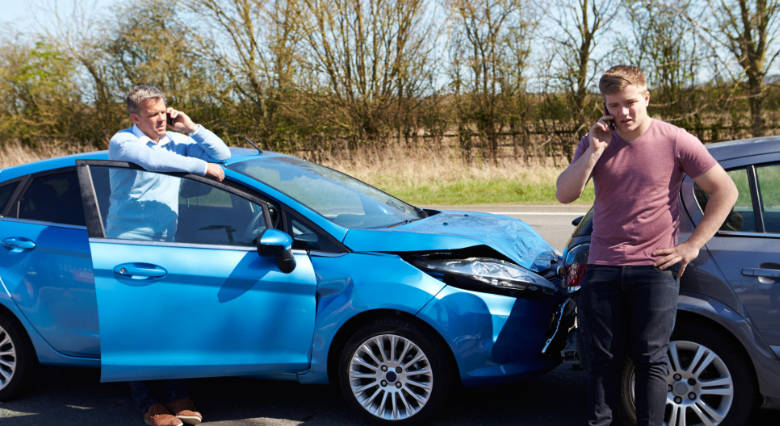Who Is At Fault In An Auto Accident?
Determining Liability Is Important, But Can Be Tricky.
It can happen in an instant.
Squealing brakes, shattered glass, twisted metal.
An auto accident is one of the most traumatic incidents a person can endure. In addition to physical injuries, a collision can leave lasting psychological scars, as well.
Plus, there's the matter of how to get on with your life. You might be unable to work and without a car.
Who will compensate you for your loss?
Kentucky's No-Fault System
Kentucky employs a "no-fault system." Specifically, Kentucky is a "choice no-fault" state.
This means that a motorist is generally compensated by his own insurance company for damages, regardless of who is at fault. These damages can include medical costs, lost wages and pain and suffering.
A claim may rise above the no-fault system, however, if medical costs are more than $1,000 or if serious, permanent injury, deformity or death occur.
Personal Injury Protection, or PIP, is also required in Kentucky. PIP coverage must also be exhausted before a liability policy can come into play.
But once the threshold for injury is met and PIP is exhausted, the liability insurance is open to a claim for lost wages, medical expenses, and pain and suffering.
Who Is The At-Fault Party?
Determining the drive at fault happens early in the process, but it's very important. Once an initial determination into fault is made, it can be very difficult to change.
That's why it's always wise to contact the police immediately following an accident. You can do this by simply calling 911.
The local police department, sheriff's department or Kentucky State Police will send one or more investigators to examine the cause of the collision. Statements will be taken from each driver, as well as any independent witnesses, such as bystanders, passers-by and even passengers.
Next the investigators will examine the physical evidence: the position of vehicles, where the damage occurred, any tire tracks or skid marks. Using this information, the investigator will determine the most likely series of events. Based upon their findings, a preliminary determination of fault will be made.
Comparative Fault
All of the fault may fall on one party, or the fault may be shared.
When this happens, however, the fault is never shared equally. One party is always more at fault than the other.
What is known as "comparative fault" can come as quite a surprise to many people involved in an auto accident.
Imagine being injured in an auto accident due to the negligence of another person, only for that person to turn around and say you are completely or partly to blame.
The Kentucky rule for comparative fault states that any damage award be reduced by a percentage equal to the party's blame.
For example, if the other party's insurance company accepts 80% of the liability and argues that you are 20% at-fault, any settlement is reduced by 20%. Therefore, a claim worthy of a $10,000 settlement would be worth only $8,000.
Comparative fault is applied while a lawsuit is being heard in court, but can also be used during settlement negotiations.
Liability Errors In Police Reports
The preliminary determination of fault made by the police is important because it will be recorded in the official police report. This report will be sent to insurance companies, attorneys and anyone else involved in the claim. Once it's on paper, this can be very difficult to change.
If you uncover an error in a police report, or if you think the wrong party was placed at fault, contact the investigating officer right away. His or her name should appear clearly on the report, along with the appropriate agency.
Although police make the initial determination of liability, insurance companies will often conduct their own investigation. Their findings might agree with those of the police and they might not. An insurance adjuster might choose to transfer fault to the opposite party, or assign 10% or 20% more fault to one of the parties involved.
This can substantially affect how much the insurance company is willing to pay out on any given claim. Soon after accident, you might be contacted by an insurance company asking you to accept a lowball offer for your claim.
Contact A Kentucky Injury Attorney Today
The only way to protect yourself and your rights is by contacting an experienced Kentucky injury attorney. The law office of Dallas & Turner has been practicing law for more than 30 years. Ours is a name you can trust.
No matter where you live in the state of Kentucky, we offer a free, no-risk consultation to accident victims. This means you’ll never be charged to speak to us and the only way we receive payment for our legal services is if you receive compensation for your railroad accident and injury.
To speak to a Dallas & Turner PLLC attorney immediately, please dial 859-630-0666. You can also write to us by using our free contact form.
Our clients come first, no exceptions. We look forward to working for you.
James Ryan Turner, Experienced Injury Lawyer in Florence, KY
"As a no-fault state, Kentucky residents who have been in an accident need guidance understanding how fault plays into their case. We're here to lend our experience and help you with a free consultation."

